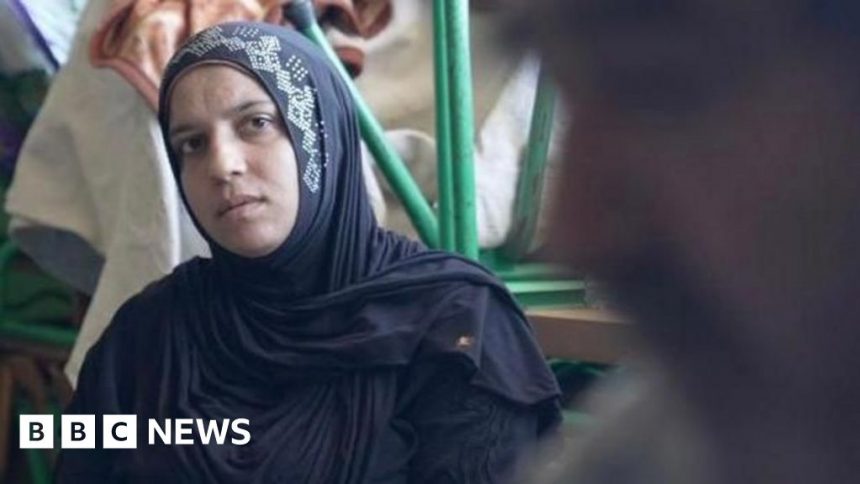‘I grabbed my grandchildren and ran’: Lebanon families flee Israeli strikes
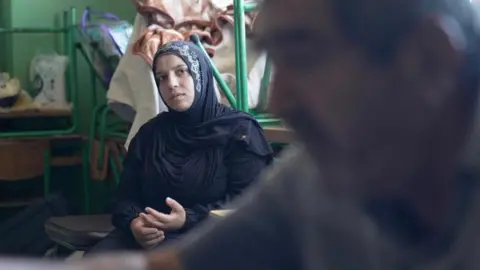 BBC
BBCIsrael’s continuing air strikes may have forced as many as one million people from their homes across Lebanon, the country’s prime minister, Najib Mikati, has said.
Lebanon’s health ministry reported 105 people killed in Sunday’s strikes – two days after Israel assassinated Hezbollah leader Hassan Nasrallah in Beirut. Meanwhile, Hezbollah fired more rockets into northern Israel.
Lebanese families displaced by the air strikes have told the BBC of their fear and anxiety over what is to come.
We visited one school in a southern Beirut suburb housing around 2,000 people who have fled their homes. Many of them were having to sleep in the courtyard because they could not find space indoors.
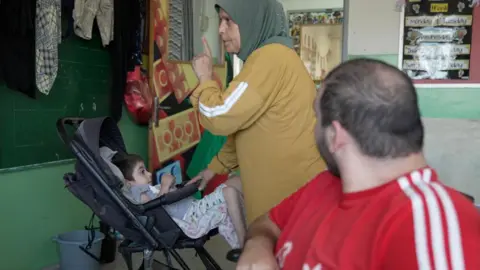
‘I just grabbed my grandchildren and ran’
Grandmother Um Ahmad says a building just next to their home in southern Lebanon was badly hit by an Israeli air strike. She and her family survived “magically”, she says.
“I just grabbed my grandchildren and ran. A part of our house was in flames.”
They jumped into their car and drove off while more buildings were being bombed in their street. They looked back to see their house was also levelled to the ground.
“At least we know for sure that we don’t have a home to go back to,” Um Ahmed says while trying not to break into tears.
“I don’t want to cry. There is nothing to cry about any more. We lost everything, but thanks to God, we survived.”
They fled to Beirut from a tiny village near the city of Tyre. Their refuge is a classroom that is now a shelter for hundreds of people.
Laundry is draped around the room, hanging off the whiteboard, walls and windows.
Um Ahmed’s two grandsons have disabilities and mental health issues.
She sounds frustrated and angry: “I’m sad for Gaza’s children, but what is our children’s fault?”
We hear a loud bang as emergency teams offload some supplies outside in the corridor. Her younger grandson starts crying.
“Look how the child is scared. With every loud sound, every door slamming, he starts crying and screaming.”
She says her grandchildren can’t sleep at night any more, so she and her husband cannot either. “All the children here are reacting to any loud sound. They think it’s an air strike.”
Um’s husband Barakat joins us. He blames the politicians without mentioning Hezbollah.
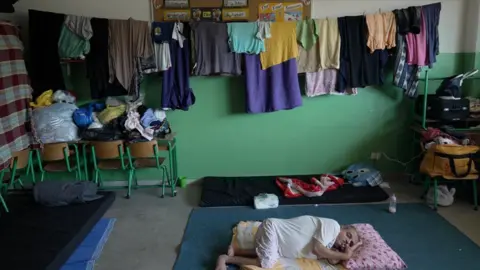
“I know we needed to support the people of Gaza, but that wasn’t our war. We of course want to protect our land, but for us, for the Lebanese, we should fight for ourselves.”
Like many other families here, they have been displaced before. They lost their homes in 1982 and 2006 too. This is now the third time.
Barakat says he and his family are exhausted and don’t want war. “We don’t wish for Israeli children to die, nor for our own children to die. We should live in peace.”
I ask him if he thinks that is possible. “I don’t think so. Netanyahu doesn’t want peace. It is now very clear and this war is going to be much harder than 2006 [when Israel and Hezbollah went to war], for sure.”
“Just as we cry for children in Gaza, we cry for our own children too. Just as the Israelis cry and are afraid for their children, so do we,” says Um.
Messages from the Israeli army
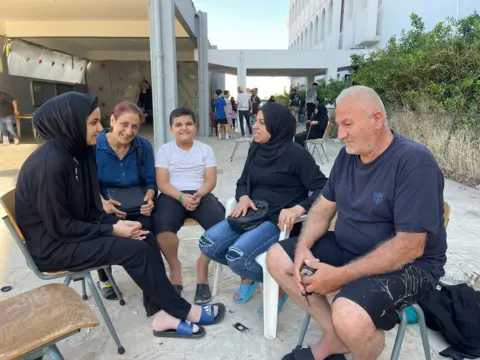
Other families recall being warned by the Israeli military of impending attacks.
“We only had short notice. We received a message that was sent by the Israeli army to our phones, asking us to leave our house,” says 65-year-old Kamal Mouhsen.
“I just grabbed my car key and left with my family.”
He was one of many people who received the same message at about noon on Saturday. He says there was a series of air strikes on their neighbourhood soon afterwards.
He is wearing a T-shirt and shorts. “All we have now is what you see we are wearing.”
He is sitting with his daughter, grandson and two of his neighbours in the courtyard of the school where they took refuge.
“We are now among 16 people living in one room,” says Nada, Kamal’s daughter. “In the 2006 war, we also came here.”
Nada believes this war will be more difficult. “They [the Israelis] killed the leader of Hezbollah. This itself shows that this time is different.”
Escape through Syria
For others, leaving the country through war-torn Syria seemed like a better option than hoping to survive Israeli air strikes.
Sara Tohmaz, a 34-year-old Lebanese journalist, fled her house in Beirut’s southern suburbs with her mother and two siblings the Friday before last.
She told BBC News Arabic she feels relief that they took the decision to leave the country before Israel assassinated Hezbollah’s leader.
The family took almost 10 hours to reach Jordan through Syria by car.
“We are lucky enough to have a place to stay in Jordan, where my mother’s relatives are based,” she says.
“We don’t know what will happen next, and don’t know when we will be back.”
Additional reporting by Ethar Shalaby, BBC News Arabic



